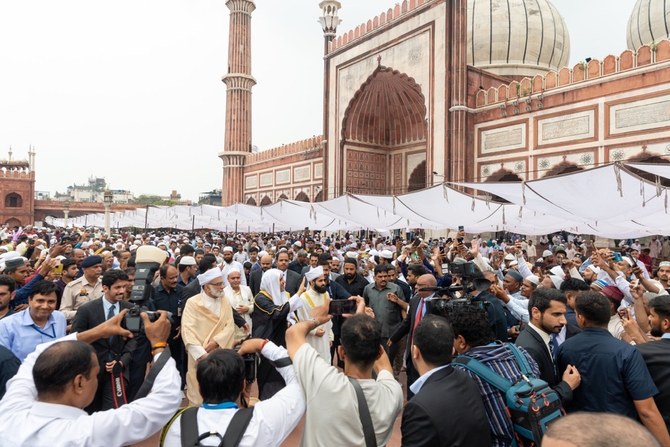NEW DELHI: Constructed during the Mughal Empire some 400 years ago, the Masjid-e-Jahan Numa in the north Indian city of Delhi, popularly known as the Jama Masjid, is among the largest, most beautiful and most cherished places of worship on the Indian subcontinent.
Although the complex can accommodate 85,000 worshippers, it was standing room only when Sheikh Mohammed bin Abdulkarim Al-Issa, secretary-general of the Muslim World League and chairman of the Organization of Muslim Scholars, delivered the Friday sermon last week.
According to the MWL website, it was the first time in 400 years that a religious figure from outside India had delivered a sermon at the mosque. Al-Issa did so at the invitation of its imam and with a warm welcome from worshippers.
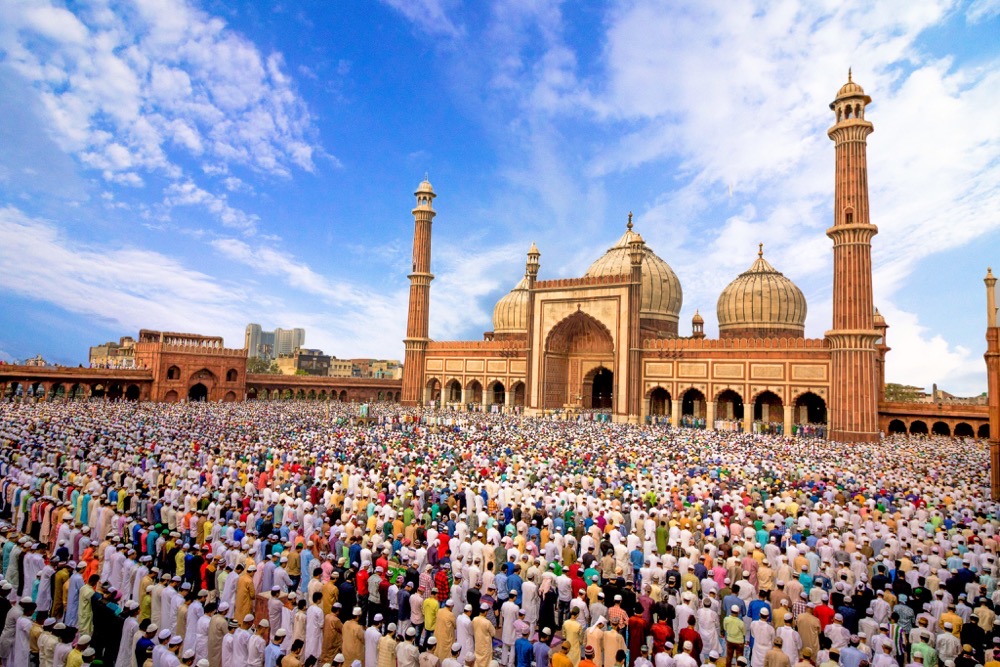
A standing-room-only congregation heard the first sermon in 400 years at the Jama Masjid. (Shutterstock)
Emperor Shah Jahan, the fifth Mughal ruler in India, presided over the completion of the Jama Masjid in 1656. Since then, the mosque has shaped the popular memory of the people of Delhi and the wider Indian nation.
“Its foundation stone was laid on Oct. 6, 1650, under the supervision of Saadullah Khan, the prime minister, and Fazil Khan, the head of Shahjahan’s household establishment, at the cost of ten lacs of rupees,” wrote Sadia Aziz, a research scholar at the University of Delhi’s Department of History, in her 2017 essay “Mosque, Memory and State: A Case Study of Jama Masjid (India) and the Colonial State c. 1857.” (A lac is a unit in the Indian numbering system equal to 100,000.)
It was built on a hill called Bhojla Pahari, 1,000 yards from the Red Fort, the palace-fortress of the Mughal empire in their newly established capital, Shahjahanabad.
The mosque measured about 261 feet long and 90 feet wide, its roof surmounted by three domes decorated with stripes of black and white marble.
Jama Masjid has three entrances, the northern, southern and eastern, of which the last was the Shahi gate, reserved exclusively for the emperor, who would arrive in a procession with princes, nobles and their retinue from the Red Fort every Friday and on Eid days.
The mosque is known by two names, the first of which is the royal one bestowed upon it by the emperor: Masjid-i-Jahan Numa. “Jahan” means “world” and “Numa” means “visible,” signifying, figuratively, a structure that commands a view of the entire world.
The second name, Jama Masjid, meaning “collective or congregational masjid,” emerged out of the social consciousness of the people and over time became more popular than the formal name.
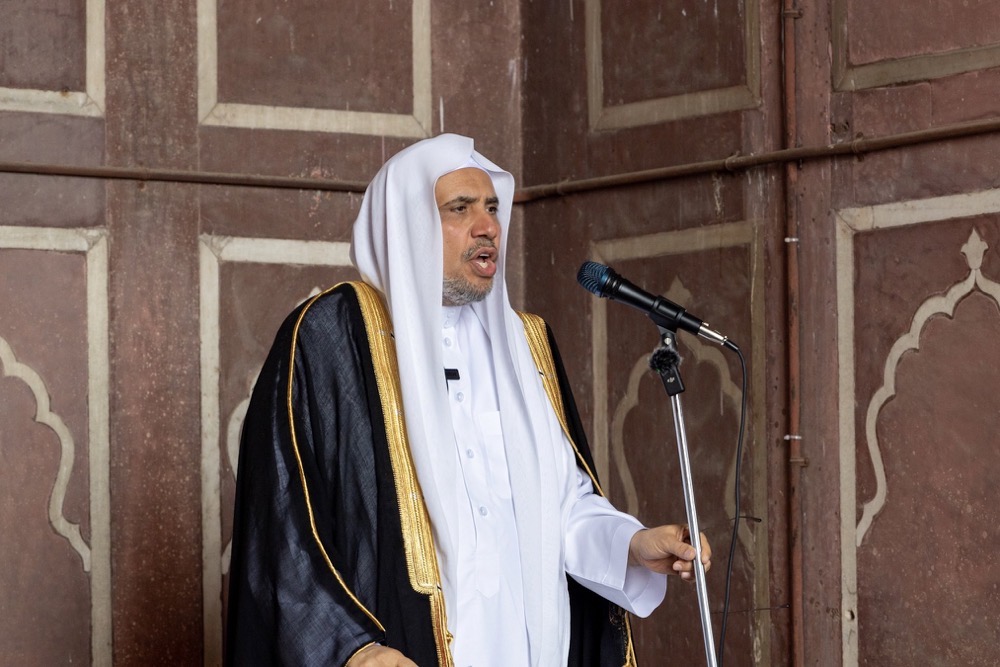
MWL chief Sheikh Dr. Mohammed bin Abdulkarim Al-Issa. (Supplied)
When the city of Delhi was taken over by the British in 1803, leaving the Mughal emperor in place as the ritual imperial head, colonial authorities assisted with the repair and renovation of the mosque.
However, such efforts by the colonial authorities to endear themselves to the local population came to an abrupt halt during the uprising of 1857, known as the Indian Mutiny or the First War of Independence.
When colonial authority was restored in mid-September 1857, the Muslim population was specifically targeted, as the British perceived the uprising as being a Muslim conspiracy against them. Consequently, numerous mosques in Delhi were demolished.
Various options were discussed by the British as to the fate of the Jama Masjid. The plans ranged from demolition to conversion to a church or secular college. In the end, a plan was hatched to turn it into barracks for Sikh soldiers from Punjab.
After this initial planning, however, the colonial authorities softened their approach and instead tried to use the mosque as a bargaining chip to win over the Muslim citizenry of Delhi. After much petitioning, the mosque was returned to the inhabitants of the Old City on Nov. 28, 1862, with the imposition of several rules and regulations that were to be followed by worshippers.
Given the Jama Masjid’s long and checkered history, it was therefore a moment of great significance to have the head of the MWL deliver the Friday sermon and lead prayer before a congregation that reflected the diversity and unity of modern India.
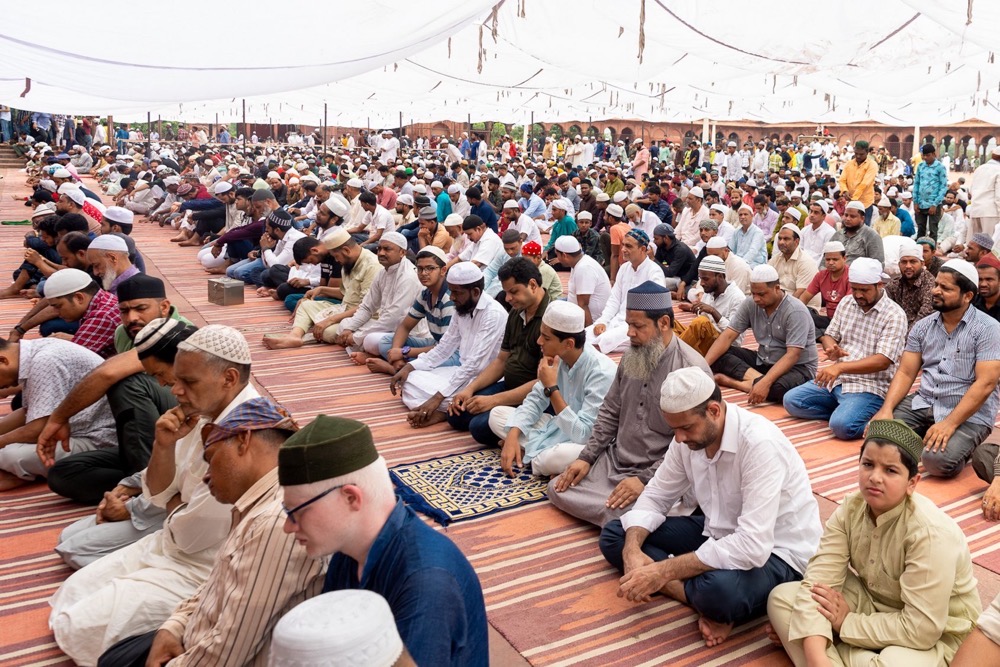
the complex can accommodate 85,000 worshippers. (Shutterstock)
Al-Issa arrived in the capital New Delhi on July 10 at the head of an MWL delegation, following an official invitation from the Indian government. During his trip, he met Indian President Droupadi Murmu, Prime Minister Narendra Modi and Minority Affairs Minister Smriti Irani. He also held meetings with senior Indian Islamic scholars and religious leaders of various faiths.
His visit was designed to promote fraternal and friendly dialogue, to enhance understanding and cooperation, and to discuss many topics of common interest between the faiths, officials said.
“The visit of His Excellency Dr. Mohammed bin Abdulkarim Al-Issa enhances the relations between the two countries as well as relations between Muslims and followers of other faiths in India,” Mohammed Abdul Hakkim Al-Kandi, the imam of Jama Masjid, said in a video message for the MWL.
India is home to 1.4 billion people, including about 210 million Muslims who constitute the largest Muslim-minority population in the world. The majority of Indians are Hindus. Other minorities include Jains, Sikhs, Christians and Buddhists.
More than 75 years after India gained its independence, the country has generally managed to live up to the ideals of a society in which the followers of many religions can live in harmony and practice their faiths freely. However, intercommunal conflicts have routinely flared, leading to calls for mediation and dialogue.
Religious leaders who were present at Al-Issa’s sermon and other events during his visit said they hoped it would further encourage interfaith harmony.
JAMA MASJID FACTS
Old Name Masjid-i-Jehan- Numa (the mosque that reflects the whole world)
Location Old Delhi, India
Date of construction 1644-1656
Built by Mughal Emperor Shah Jahan
Architect Ustad Ahmad Lahori
Capacity 85,000 in total
Length 40 meters
Width 27 meters
Domes 3
Gates 3
Minarets 2
Minaret height 41 meters
Material Red sandstone, marble
Cost 1 million rupees
Asghar Ali Imam Mahdi Salafi, ameer of the Jamiate Ahle Hadeeth in India, said he hoped the visit would have “far-reaching significance” and a “profound positive impact.”
Syed Naseruddin Chishty, chairman of the All India Sufi Sajjadanashin Council, said the visit sent a message that Muslims believe in religious harmony and coexistence.
“Today is a great event,” he said. “It is a message to the whole world, the Muslim world especially, for Muslims living in India. India only wants peace. India believes in unity, in diversity and in universal brotherhood.”
Speaking to Arab News, Muddassir Quamar, professor at Jawaharlal Nehru University, said: “Saudi Arabia has been working toward building an interfaith dialogue globally. At a time when the world has witnessed so much division and tension among different cultures and faiths, greater interfaith dialogue can help heal the humanity and develop lasting cross-cultural connections.”
He continued: “Saudi Arabia and India are close partners and the abode of two faiths, Islam and Hinduism. Both believe in peace and universality of humanity, so the visit by Sheikh Al-Issa will help in developing even closer cultural relations between India and Saudi Arabia. Indian Muslims have seen the visit in a positive light.”
One of Al-Issa’s speeches in the Indian capital, at the Vivekananda International Foundation, was attended by prominent religious leaders, intellectuals, academics, politicians and parliamentarians. Among the attendees was Adil Rasheed, a senior Indian strategic affairs and defense policy analyst.
“Dr. Al-Issa’s message of religious harmony and peace was very well received,” Rasheed told Arab News.
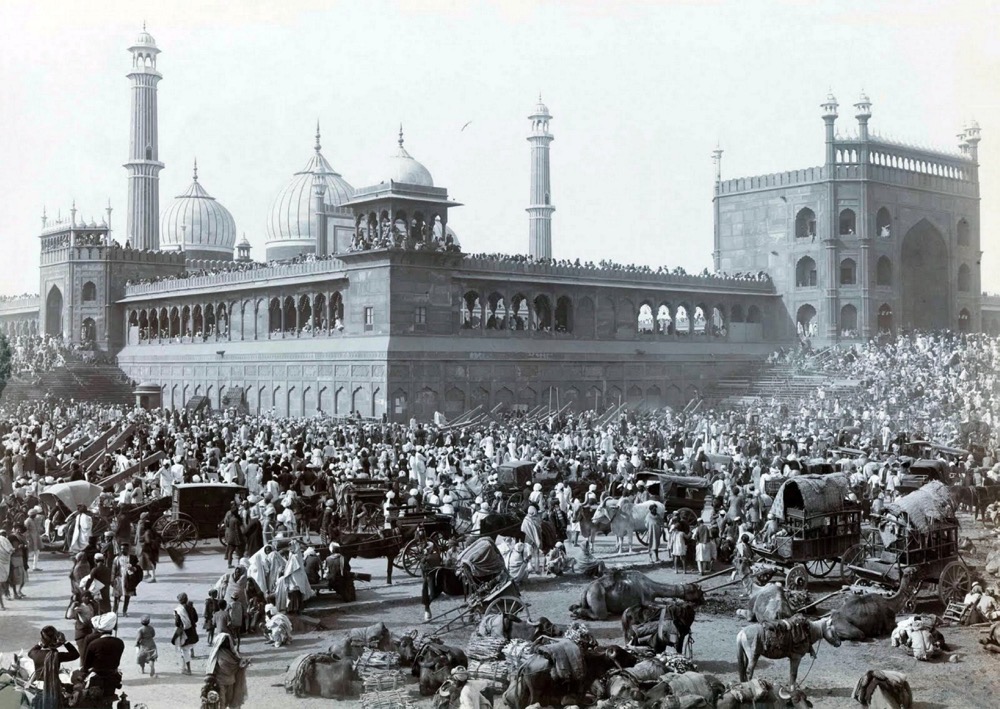
The Jama Masjid, seen here in a photo from 1877, was returned by the British colonial authorities to Delhi’s Muslim inhabitants in 1862. (Getty Images)
“His scholarship, wisdom and oratory kept audiences rapt, interspersed with frequent rounds of spontaneous applause.
“Dr. Al-Issa’s message of correct upbringing of children, untainted by radical and extremist thought, was highly appreciated, as was his insistence on the need for constant dialogue between religions and civilizations as the only legitimate means for resolving disputes and misunderstandings.”
Rasheed’s view was seconded by Siraj Kureshi, chairman of the India Islamic Culture Center. “Sheikh Al-Issa is a major personality and a scholar. He has a huge reputation particularly in the Islamic countries, so wherever he goes people look at him with a lot of respect,” he told Arab News.
“The message he delivered to Indians was good. His topics were humanity , women empowerment, youth and education among other things. These are his qualities. That is why people like him and listen to him attentively.”
He added: “Saudi-Indian relations are very old. They go back hundreds of years. They have honoured our prime ministers. There is a huge Indian population working in Saudi Arabia. I am sure his message has been well received.
“Sheikh Al-Issa’s visit should not be linked to the internal affairs of India. We should keep in mind our age-old relations with Saudi Arabia. I am sure he had his messages for the PM and the president when he met them during his visit.”



